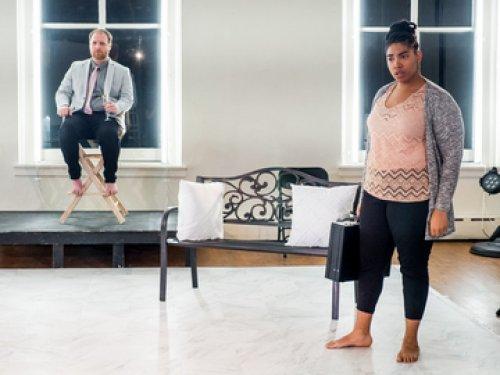The Maid’s Tragedy
Beaumont & Fletcher’s rarely seen Jacobean tragedy gets a modern dress production to highlight its #Me Too relevance without the updated language to support it.

Erin Roché, Sydney Battle, Greg Carere, Alyssa May Gold and Michael Thatcher in a scene from Beaumont & Fletcher’s “The Maid’s Tragedy” (Photo credit: Carol Julien)
[avatar user=”Victor Gluck” size=”96″ align=”left” ] Victor Gluck, Editor-in-Chief[/avatar]The relatively new theater company Pocket Universe deserves praise for attempting Beaumont and Fletcher’s rarely seen 1619 revenge play, The Maid’s Tragedy, which has prescient relevance in the #MeToo era with its sexual coercion and resulting cover-up. However, as conceived by Alyssa May Gold (who acquits herself well in the title role) and directed by Lucy Gram, the production does almost everything it can to sabotage an audience’s being able to follow this unfamiliar Jacobean play. Don’t blame the talented actors who are quite wonderful despite fighting tremendous drawbacks.
In publicity materials, this production of the 1619 revenge tragedy is described as being reset in a Hollywood film studio, with the king now the studio head and the heroine Evadne, an actress caught in his web. However, aside from a call sheet as the cover of the program and five director’s chairs scattered around the rectangular playing area, there is absolutely no way to know this from the production itself which sticks to the original text.
Director Lucy Gram uses six actors to play 11 roles which has worked for such companies as Bedlam and Fiasco. However, here the four actresses play both men and women, three of them never change their costume, voice or look when they return as their other characters so it is very difficult to keep the roles straight. Aleca Piper playing the roles of Calianax (an elderly man), Lysippus (a younger man) and Dula, a lady-in-waiting, first takes off her white sweater, then puts up her hair, but if you are not following this very carefully, the changes are lost on you. Her use of a loud, booming voice does not help in differentiating her roles or in understanding her lines. Erin Roché and (Ms.) Sydney Battle play men and women alternately with no changes of any kind.
The actors are dressed in contemporary clothing in combinations of black and white (Monica Day, wardrobe supervisor) but this bland look suggests neither Hollywood nor anywhere else, other than a rehearsal. The playing area on a white linoleum rectangle (plus one wrought iron black bench suitable for a garden) has no atmosphere nor does it suggest any locale at all. The five director’s chairs scattered around the walls of the space are used by the actors when they are not in scenes but this is both awkward and distracting.

Alyssa May Gold and Greg Carere in a scene from Beaumont & Fletcher’s “The Maid’s Tragedy” (Photo credit: Carol Julien)
The echo in the large theater makes the unfamiliar lines difficult to follow and when actors have their backs to one of the three sides where the audience sits, this is only exacerbated. Christine F. Tang’s lighting consists of spotlights in the four corners but this is aimed in the audience’s eyes which makes it extremely hard to concentrate on the action. The uncovered windows in the theater let in natural light for at least the first third of the show this being June and is also distracting. As none of the language or pronouns has been updated, the Hollywood conceit (plus the four actresses playing men) is basically lost on the audience.
Aside from its modern relevance, The Maid’s Tragedy is one of the very few Elizabethan tragedies to have an original plot, which gives it added significance. In the Beaumont and Fletcher text, Melantius, a soldier, returns home to the island of Rhodes victorious from the wars. He is told that his best friend Amintor has been married that very day but he is surprised to find that it is not to his long time fiancée but to Melantius’s own sister Evadne. However, on their wedding night, Evadne tells Amintor that she is the king’s mistress, that she has been married off to Amintor as a cover-up for any children she shall have, and that she will never have marital relations with Amintor who is to be husband in name only. Sworn to secrecy, Amintor believes his hands are tied due to his loyalty to his king.
Unfortunately, in his grief Amintor is unable to keep the secret and when Melantius finds out he berates his sister as a whore worthy of death. While Melantius plots to take over the king’s castle, Evadne takes matters into her own hands. However, Aspatia, the jilted fiancée, knows none of this and she attempts to deal with her own wrongs. The final death toll rivals such plays as Hamlet and Macbeth.
In this production, Melantius becomes Evadne’s sister and so it is a woman who is left to restore the honor of the family. Their brother Diphilus is played by Ms. Sydney Battle but it is not clear whether she is meant to be a man or woman. Piper plays the King’s brother Lysippus, his heir, but it is also not clear whether this character is meant to be male or female. According to the publicity materials, Evadne is an actress working for the “king” and Melantius is a film producer but there is nothing in the play as staged to reveal these new relationships.

Michael Thatcher and Aleca Piper in a scene from Beaumont & Fletcher’s “The Maid’s Tragedy” (Photo credit: Carol Julien)
Despite the problems with the production, the acting is of a high caliber though some actors are simply miscast in roles meant for the opposite sex or older actors.
As Evadne, the maid of the title, Gold is initially a spitfire and then a determined revenger. She commands the stage in all her appearances. She is matched by powerfully built, bearded Greg Carere who makes Amintor a very sympathetic, sensitive character. His layered, multifaceted performance grounds the tragedy.
As the treacherous and entitled king, Michael Thatcher has all the arrogance and belligerence of the type, looking a great deal like a cleaned up version of Harvey Weinstein. Battle is moving as the rejected Aspatia who is never told of the king’s perfidy but blames her former lover. Erin Roché gives a bold, forceful performance as Melantius but she cannot overcome the script’s calling her a soldier rather than a film producer. Piper is credible in her three roles though they are hardly different from one another.
While Pocket Universe has been admirably ambitious in presenting this extremely rare Jacobean tragedy, it is to be rejected in that the results are misguided. You can attend their performances of The Maid’s Tragedy, but you will not feel you have actually seen the play that Beaumont and Fletcher wrote. As for the cast, we look forward to seeing them in something more worthy of their talents soon again.
The Maid’s Tragedy (through June 30, 2018)
Pocket Universe
Access Theatre Gallery Space, 4th Floor, 380 Broadway, in Manhattan
For tickets, call 917-362-6467 or visit http://www.pocket-universe.com
Running time: two hours and five minutes with no intermission






Bold of someone who thought Evadne was the titular maid (or a maid at ALL) to speak with such authority on the text. If she was “the maid,” there would not have been a tragedy. That is the point of the play. That Mr. Gluck thinks this production did not honor Beaumont & Fletcher’s play makes me very excited to see it this weekend as I can only assume that means this production is actually spot on.